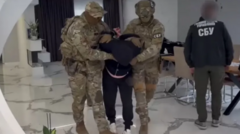Ukraine's Security Service has arrested two former military personnel, suspecting them of espionage activities for Hungary aimed at gathering intelligence on Ukraine's military defenses. This unprecedented discovery has raised tensions between the two nations amid Hungary's historical alignment with Russia.
Ukrainian Security Service Discovers Alleged Hungarian Espionage Network

Ukrainian Security Service Discovers Alleged Hungarian Espionage Network
Two individuals have been arrested in Ukraine for allegedly operating a spy network on behalf of Hungary, marking a significant turn in Ukraine-Hungary relations.
In a significant development, Ukraine's Security Service (SBU) announced the arrest of two individuals allegedly involved in a Hungarian espionage network aimed at gathering sensitive intelligence regarding Ukraine's military defenses near their border. The SBU described this incident as a historic first for Ukraine, highlighting that a Hungarian military intelligence operation has been discovered working against Ukrainian interests.
The detained suspects, identified as former members of the Ukrainian armed forces, were accused of collaborating with a Hungarian intelligence officer to collect information about military assets, particularly those located in the Zakarpattia region, which shares an extensive border with Hungary. The SBU claimed that the spies had been monitoring the location and number of air defense systems in the area, and even gathering insights into local public sentiment, presumably to gauge reactions to any potential Hungarian military actions.
Hungarian Foreign Minister Peter Szijjarto responded cautiously to the allegations, suggesting that they should be considered with skepticism as possible propaganda until further information is disclosed. He implied that Ukraine has a history of manipulating narratives against Hungary, a claim that complicates the validity of the accusations.
Tensions between Hungary and Ukraine have been escalating since the onset of Russia's full-scale invasion, with Hungarian Prime Minister Viktor Orban maintaining a controversial stance that often favors Russian interests. This betrayal is particularly troubling, according to analysts, given Hungary's NATO membership, where such actions undermine collective defense values.
The alleged spy network's activities appear largely motivated by collecting military intelligence rather than direct support for Russian military endeavors in Ukraine, though the implications for NATO's unity and operational integrity raise alarms among defense analysts.
Former UK Defence Secretary Sir Ben Wallace expressed concern over the nature of this intelligence-gathering, emphasizing the gravity of hosting such networks within NATO countries. The broader geopolitical ramifications of this incident will likely reverberate through NATO discussions as they reflect on member states’ allegiances and their impact on the ongoing conflict.
Despite the allegations being serious, the actual geographic distance of Zakarpattia from the current front-line battles means the immediate threat may be limited. However, Ukraine remains alert to potential infiltration from an ally that has grown increasingly distant since the conflict began. The unfolding situation adds another layer of complexity to Ukrainian-Hungarian relations, historically fraught with tensions over ethnic identity issues.
With around 150,000 ethnic Hungarians residing in Ukraine's Zakarpattia region, the political ties remain contentious, leading to fears that incidents like these could further exacerbate divisions. Both nations find themselves navigating a complicated backdrop of national identity and foreign influence, particularly as the war with Russia continues to evolve.
The detained suspects, identified as former members of the Ukrainian armed forces, were accused of collaborating with a Hungarian intelligence officer to collect information about military assets, particularly those located in the Zakarpattia region, which shares an extensive border with Hungary. The SBU claimed that the spies had been monitoring the location and number of air defense systems in the area, and even gathering insights into local public sentiment, presumably to gauge reactions to any potential Hungarian military actions.
Hungarian Foreign Minister Peter Szijjarto responded cautiously to the allegations, suggesting that they should be considered with skepticism as possible propaganda until further information is disclosed. He implied that Ukraine has a history of manipulating narratives against Hungary, a claim that complicates the validity of the accusations.
Tensions between Hungary and Ukraine have been escalating since the onset of Russia's full-scale invasion, with Hungarian Prime Minister Viktor Orban maintaining a controversial stance that often favors Russian interests. This betrayal is particularly troubling, according to analysts, given Hungary's NATO membership, where such actions undermine collective defense values.
The alleged spy network's activities appear largely motivated by collecting military intelligence rather than direct support for Russian military endeavors in Ukraine, though the implications for NATO's unity and operational integrity raise alarms among defense analysts.
Former UK Defence Secretary Sir Ben Wallace expressed concern over the nature of this intelligence-gathering, emphasizing the gravity of hosting such networks within NATO countries. The broader geopolitical ramifications of this incident will likely reverberate through NATO discussions as they reflect on member states’ allegiances and their impact on the ongoing conflict.
Despite the allegations being serious, the actual geographic distance of Zakarpattia from the current front-line battles means the immediate threat may be limited. However, Ukraine remains alert to potential infiltration from an ally that has grown increasingly distant since the conflict began. The unfolding situation adds another layer of complexity to Ukrainian-Hungarian relations, historically fraught with tensions over ethnic identity issues.
With around 150,000 ethnic Hungarians residing in Ukraine's Zakarpattia region, the political ties remain contentious, leading to fears that incidents like these could further exacerbate divisions. Both nations find themselves navigating a complicated backdrop of national identity and foreign influence, particularly as the war with Russia continues to evolve.



















